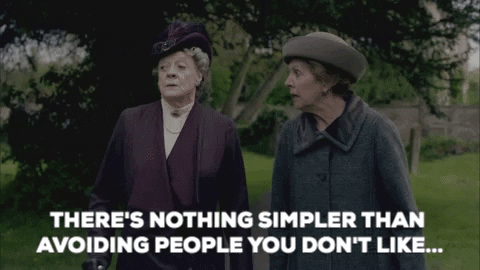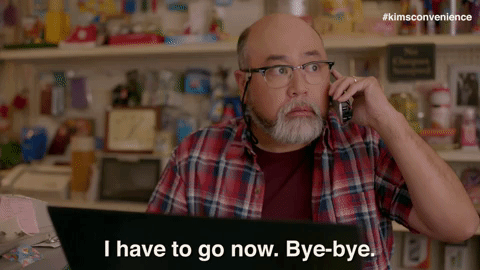In this new age of constant connection, the possibility to meet new people is at our fingertips. Whether it be new friends or potential partners, forging new relationships happens constantly, especially with the use of dating apps. However, with this ability, a new phenomenon occurs: the act of ghosting. Ghosting happens when one party severs all communications with the other party without explanation, usually occurring very suddenly. One Tinder connection can be going very well, when suddenly, you find that you got blocked and can no longer contact the person you felt this deep connection with. So why do people do this? What reason can someone hold to purposely block others that they spent their time getting to know?
Here, my recently heartbroken readers; a top ten list of why people ghost, and how you can cope with it.
1. A lack of the “it” factor.

Sometimes, the person we connected with may not end up being our forever partner. And that’s okay! The act of dating may lead to a couple of duds along the way, and they might not be the person for you. Even though you might feel a certain attachment to them, they might not feel the same for you. Although it hurts, leaving before things get more serious may spare you your feelings in the long run.
2. It’s not you, it’s their attachment style.

Attachment styles signify the certain way people interact and relate with other people. The four types of attachment styles, secure, anxious, avoidant, or disorganized attachment styles, reflect their ability to relate with a romantic or platonic partner. Attachment styles stem from how they were treated by their parents or primary caregivers. Those with anxious attachment styles are fearful of relationships and worry that those they love will abandon them. Those with avoidant attachment styles close themselves off to others and lack vulnerability, and disorganized attachment styles mix both avoidant and anxious attachment. For those who struggle with relating to others and suffer from one of the three (more troubling) attachment styles, ghosting can seem like the best option for them.
3. Timing!

Oftentimes, time doesn’t like to stay by our side. When things tend to go wrong in our life, things such as dating turn overwhelming and can seem less important in that person’s list of priorities. How do you end a relationship amicably when that may not be how you feel? How do you spare feelings when life failed to spare yours? To avoid the emotional toll of confronting someone when everything else in your life is going wrong, ghosting seems like the best option.
4. It can be inconvenient to text goodbye.

This applies to relationships that were short-lived. If there lacked much substance in the first place, the person may ghost out of convenience. Sending a text to end the “relationship” can seem unnecessary, especially if the fling was short-lived and lacked any pressure or emotional connection. Without the longevity or assurance that a fling may turn into something more serious, the ghoster lacks empathy for the other person. Ending things quickly and quietly seems much easier than a half-hearted goodbye.
5. Sometimes, people can’t handle telling the truth.

For people who struggle with confrontation, ghosting can seem like the nicest way to end things. It can be difficult to tell the other person your reasons for wanting to end communications with them, especially if it occurs because of the ghostee. Ghosting can seem like a polite way of stepping out of their lives instead of confronting them with the reasoning for wanting to end the relationship. The ghoster feels they are sparing any feelings, and rather than confronting their grievances head on, they leave on more amicable terms than they would by choosing honesty. The truth can hurt, and the ghoster would rather walk away than be upfront about their feelings.
6. You triggered them without meaning to.

In more emotionally charged conversations, saying the wrong thing happens to the best of us—especially when you are both still getting to know each other. A triggering conversation can bring up certain emotionally scarring memories or experiences. In this moment, the ghoster is sucked into an array of negative memories and thoughts. This can impair their actions and current judgement as well. Instead of confronting the person and thus getting more emotional over those memories, sometimes the best course of action remains taking a step back and taking yourself out of the situation.
7. Dating apps make the dating experience more impersonal than ever before.

Dating apps allow you to see tens of hundreds of people in one night, and that can make people seem less like people, and can make the interaction seem more impersonal. Ghosting turns easy, and slowly into a habit. When a relationship blooms and grows online, there lacks the personal connection to one another. The only relations you have with each other is through a screen. When a relationship ends, what reason does the ghoster have to ending things properly? Their only interactions with you were through messaging and maybe phone calls, but there is no tangible connection between the two of you. You fall from being a person to a profile picture, and your texts serve little to showing your personality. Ghosting turns into routine, and there lacks any shame or remorse in doing so.
8. A sign of a doomed relationship.

As awful as this may sound, if someone figured the best way to end things with you was to ghost you without warning, then there lacked much hope for the relationship anyway. Relationships are a two-way street; to earn respect, you must learn to respect first. To earn devotion, you must devote yourself. To earn love, you must burst at the seams with it. If the ghoster fails to reciprocate these common actions of a relationship, they failed to respect your time and energy anyway.
9. Something dramatically happened that changed their life.

This applies to relationships that mostly stem from personal communications. Say someone moves to a whole new place, or worse, get into an accident. Their new circumstances can lead to them needing to worry about their current life circumstances rather than a casual fling. As much as it can hurt, the guarantee that you will remain in that person’s life forever simply doesn’t exist. While the connection you two shared held meaning, the ghoster deemed it not enough to continue the relationship amid a sudden life change.
10. They simply forgot.

Although highly unlikely, the ghoster forgot about the interactions you experienced together, and simply ceased communication. It sounds impossible, but in the case where the ghoster is talking with many suitors through dating apps, you can get lost in the dust. If you fail to stand out or make a move quickly enough, you might get left behind. Without any meaningful recollection of your relationship, the ghoster may move on fairly quickly to someone else. In this rare circumstance, rarely does malicious intent exist behind the ghosting; just the consequence of a forgetful memory.
So how do we cope with being ghosted?

It sucks, and even with all these reasons for why people ghost, the ghostee finds themselves responsible for dealing with the damage. This can usually lead to humiliation, insecurity, anger and an overall loss of self-esteem. Even though it can hurt to reconcile with the fact that you got ghosted, it possible to deal with the aftermath.
One important thing to remember: being ghosted is not a reflection of you. Whether the ghoster had reasons for ghosting or not, the lack of confrontation to explain those reasons remains a reflection of their faults, not yours. If they decided the relationship with you wasn’t worth it, that does not reflect upon you. Although difficult to overcome these feelings, you can see past the lack of communication and realize their problems do not equate to your problems. Never forget, dear reader, that just because the ghoster failed to notice your worth doesn’t mean that no one will.



















